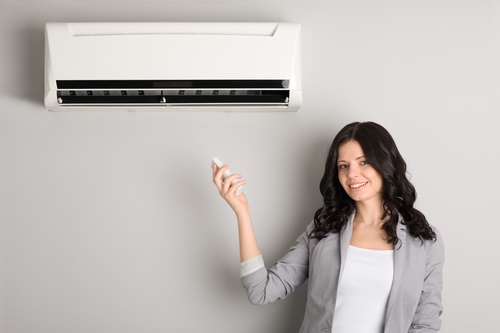A home air conditioner that’s too cold may not be able to cool your house effectively. If you see ice or moisture gathering on the outside of your unit, it may be too cold.
But it’s not always so simple to diagnose this problem. Other signs of a cold home air conditioner include a wet filter, or a frozen evaporator coil or copper piping. Read on to learn some common causes for a frigid home air conditioner.
A Dirty Filter
If your AC unit’s filter is dirty, it can’t work as efficiently and may ice over. But a dirty filter has other negative effects, as well: you’ll find your home’s air quality degrading over time, and your unit will have to work harder, which may eventually wear out the motor.
It’s a good idea to change your HVAC system’s filter once a month, to avoid these problems. And you should call in an HVAC professional anywhere between twice a year to once a season, to perform basic maintenance and ensure your AC system is functioning as it should be.

Low Freon Levels
If you don’t have enough Freon in your system, it’ll swiftly grow too cold. Add some Freon to fix the problem. But if it ices over again soon afterward, you likely have a Freon leak and should call a professional to get it fixed. Don’t handle it yourself, and be careful if you’re topping off your home air conditioner — Freon can be dangerous to your health.
Cold Weather
If you’re running your air conditioning unit in the cold, your air conditioner may freeze. It needs to run about twenty degrees colder than the temperature in your house, and when this is combined with cold weather the unit may freeze over. To resolve the problem, simply give your home air conditioner a rest.
A Malfunctioning Fan
If your unit’s fan isn’t working properly, it won’t circulate air through your home air conditioner. This can create cold zones in your AC, which may freeze over. Have an HVAC contractor inspect your unit’s fan to resolve this problem.
Blocked Vents
Like a broken fan, blocked vents will impede proper air flow into your home air conditioner. Be sure all vents that bring air into your unit are clear.
An Obstructed Contactor
The contactor in your unit is the device that lets your unit know when it can shut off. Like a clogged filter, an obstructed contactor will cause your home air conditioner to run overtime, which can damage the motor, so it’s important to fix right away. Make sure your home air conditioner’s contactor is clear of dirt, leaves or insects so that it’ll run efficiently.
It’s Time to Replace Your Unit
Alas, your home air conditioner won’t last forever. If it’s icing over frequently and you’ve gone over the rest of this list without result, it’s probably time to replace your home air conditioner — especially if the unit is ten or more years old.
Even though your air conditioning unit keeps your home cool, the unit itself shouldn’t become cold. But by heeding these tips — or calling an HVAC contractor to inspect your unit — you should be able to get your AC running at peak efficiency again.
Contact the Valley Comfort Heating and Air team. Our specialists are here to help you with your AC repair and maintenance needs.
Frequently Asked Questions
1. Why is my home air conditioner too cold and freezing up?
When your home air conditioner is too cold, it might freeze up due to several reasons such as low refrigerant levels, a dirty air filter, or blocked vents. Low refrigerant means the system can’t balance pressure, leading to ice formation on coils. Dirty filters restrict airflow, causing the evaporator coil to freeze. Similarly, blocked vents prevent proper circulation, which can also cause freezing.
2. What are the signs of a home air conditioner being too cold?
If your home air conditioner is too cold, you’ll notice ice or frost on the outdoor unit, a wet air filter, or a frozen evaporator coil. Other signs include the system struggling to maintain temperature and unusual moisture around the unit. Keeping an eye on these indicators can help diagnose and fix the issue early.
3. How does a dirty filter affect my air conditioner’s temperature?
A dirty filter in your air conditioner restricts airflow, making it harder for the system to function efficiently. This can lead to the evaporator coil icing over, which causes the unit to become too cold. Regularly changing or cleaning the filter ensures smooth airflow and optimal performance.
4. Can low Freon levels make my home air conditioner too cold?
Yes, low Freon levels can cause your home air conditioner to get too cold. Without enough refrigerant, the pressure drops, leading to the evaporator coil freezing. If adding Freon doesn’t fix the problem, you might have a leak and should call a professional to handle it safely.
5. Why does running my air conditioner in cold weather cause it to freeze?
Running your air conditioner in cold weather can cause it to freeze because the system needs to operate at a temperature significantly lower than the outside air. When it’s already cold outside, the unit overcompensates, leading to ice formation. It’s best to avoid using the AC when temperatures drop.

6. How can a malfunctioning fan cause my air conditioner to be too cold?
A malfunctioning fan can cause cold spots in your air conditioner by failing to circulate air properly. This uneven airflow can result in parts of the unit freezing over. An HVAC professional can inspect and fix the fan to restore normal operation.
7. What happens if the vents in my home air conditioner are blocked?
Blocked vents in your home air conditioner impede airflow, which can make the unit work harder and potentially freeze. Ensuring that all vents are clear and unobstructed helps maintain proper air circulation and prevents the system from becoming too cold.
8. What is an obstructed contactor and how does it affect my air conditioner?
An obstructed contactor prevents your air conditioner from shutting off when it should, causing it to run continuously and potentially freeze. Dirt, leaves, or insects can block the contactor. Keeping it clean ensures the system operates efficiently and avoids overcooling.
9. When should I replace my home air conditioner if it keeps freezing?
If your home air conditioner keeps freezing despite regular maintenance and troubleshooting, it might be time to replace it, especially if it’s over ten years old. Frequent icing can indicate that the unit is no longer efficient and a new system may be more cost-effective in the long run.
10. How can I prevent my home air conditioner from becoming too cold?
To prevent your home air conditioner from becoming too cold, regularly clean or replace the air filter, check Freon levels, ensure proper airflow by clearing vents, and have an HVAC professional perform routine maintenance. These steps help maintain the unit’s efficiency and prevent freezing issues.
By keeping an eye on these common issues and taking preventive measures, you can ensure your home air conditioner runs smoothly and efficiently. If you ever need help, don’t hesitate to call an HVAC professional.


